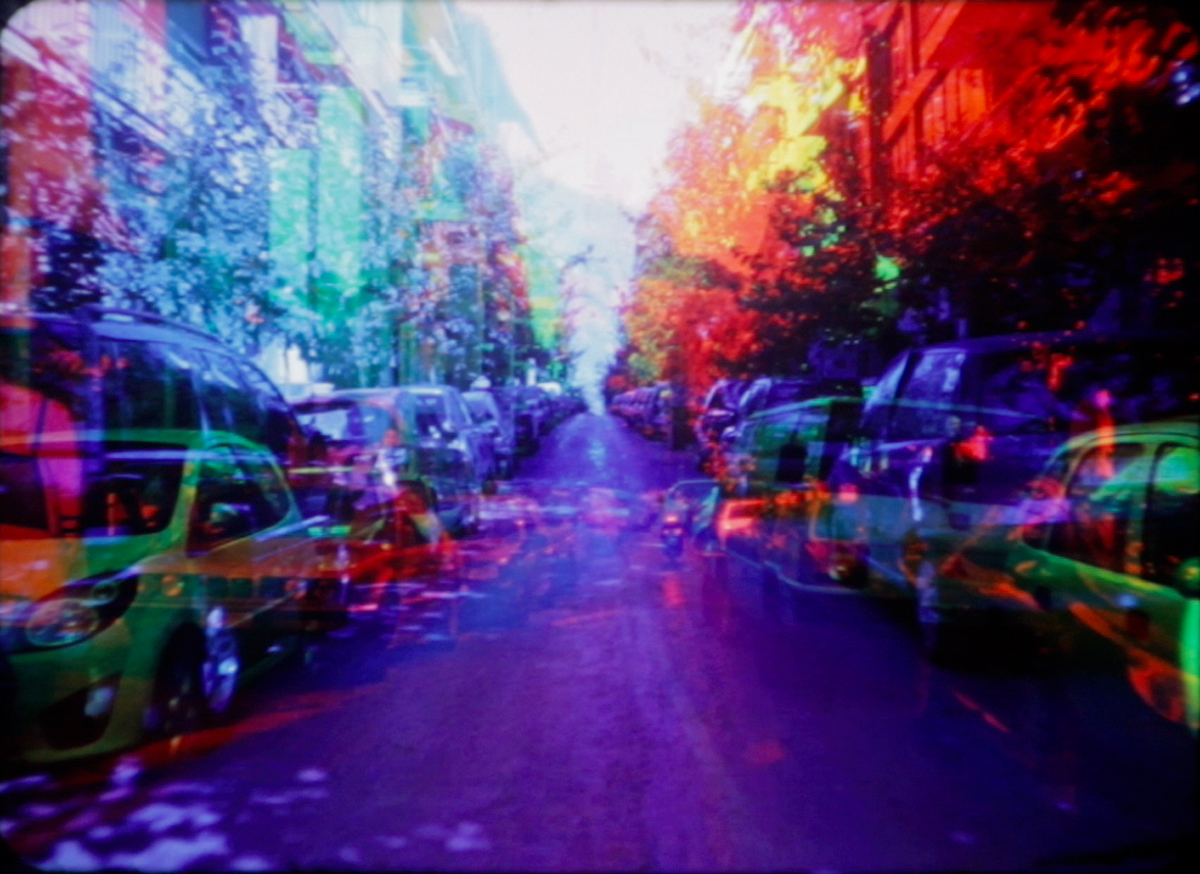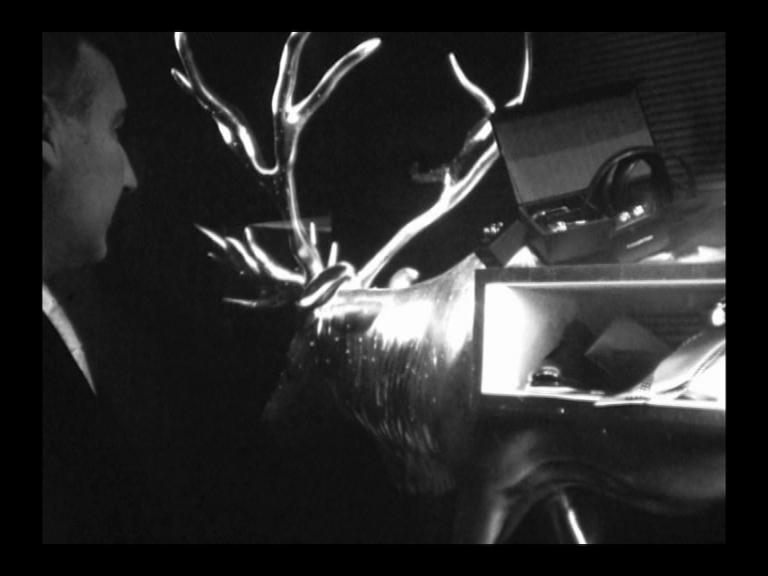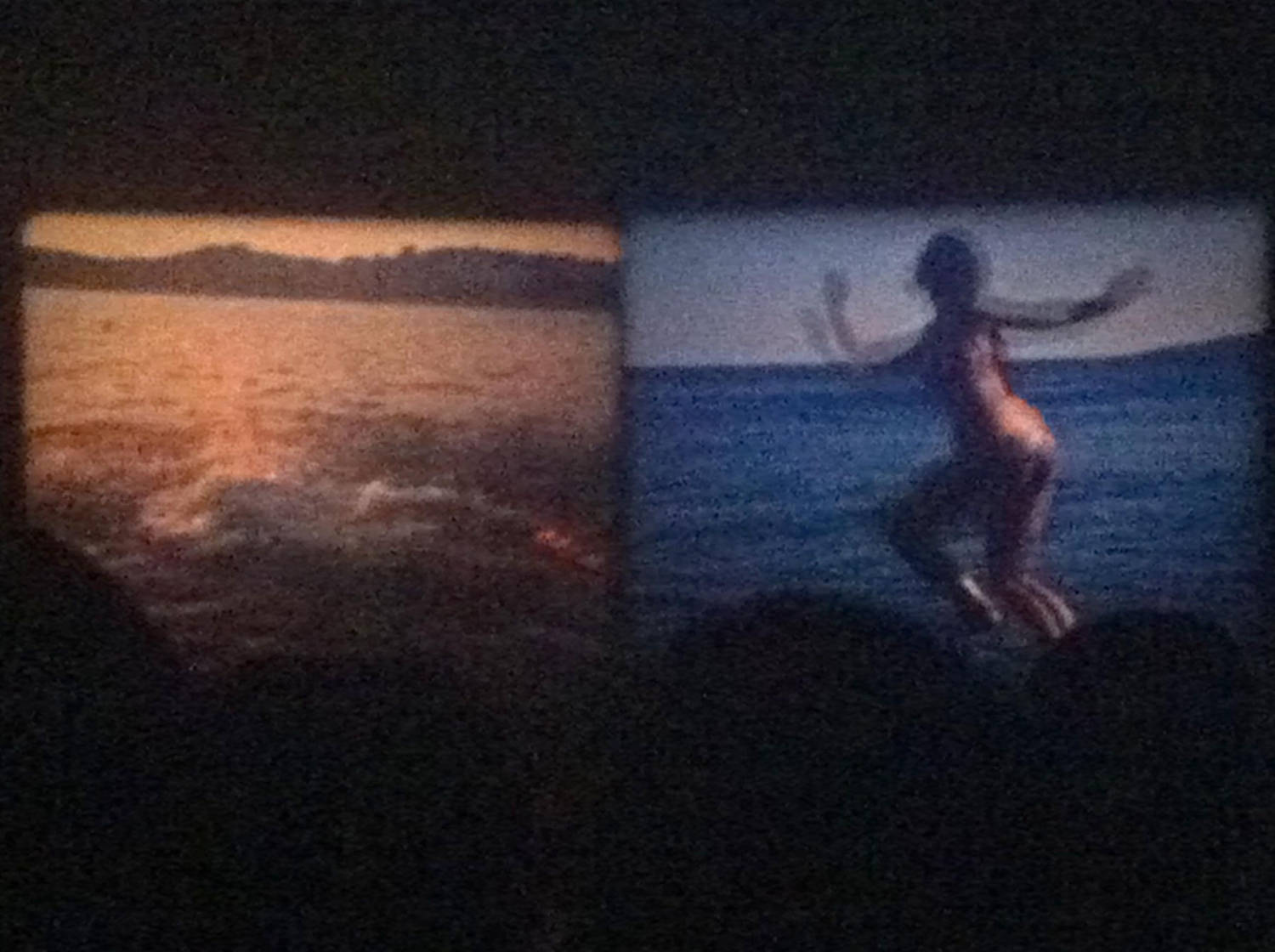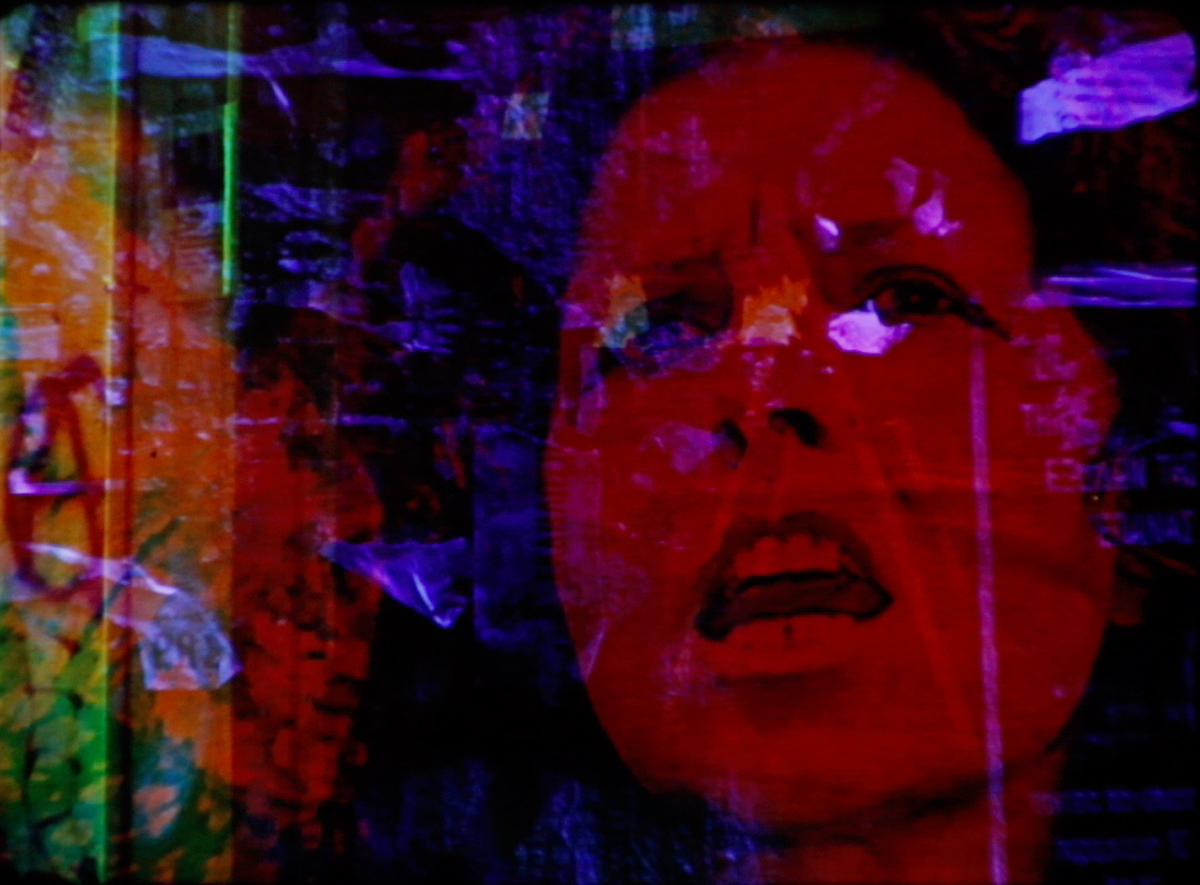Crisis Matters:
Filming Greece in Analog
21 December 2022
Geli Mademli ASCA, University of Amsterdam

Ben Russell, Austerity Measures
As part of my PhD research that investigates the concept of film heritage in Greek cinema and practices linked to it, in the paper I presented at the conference “Greek Studies Now: Local Cases, Global Debates” I wished to unfold the complex relationship makers, spectators and other agents of cinematic representation have with archives; and to reveal how a crisis of oblivion, reverberation, spectrality, and resilience is stratified in the visual technologies that give shape to a society’s visions of the past and future. Even though I will concentrate on the economy of scarcity evoked by analog filmmaking technologies in relation to the cinematic imprint of the Greek crisis, I will take some distance from the makings of film per se and address the question of technology and materiality also in relation to the exhibition of film in a festival’s curated context. This way, I am drawing a line that starts from my presentation “Exhibiting a Media Ecology of Crisis: A Visit in the Thessaloniki Cinema Museum” in the network’s first meeting in Oxford in 2020 – where I suggested the historical-political implications of the archival exhibition practices in Thessaloniki’s cinema museum – and reaches the curated program “In Kind: Greece through Other Eyes,” which I presented at Munganga theater in Amsterdam, as part of the conference.
Much has been already written on the aesthetic and ideological foundations of the “weird wave” and its function as a milestone, defining a “before” and “after” in the perception of Greek film historiography. No matter how widely it has been disputed or endorsed as a critical tool for discussing the Greek crisis, most notably by Dimitris Papanikolaou in his recent book Greek Weird Wave: A Cinema of Biopolitics (2021), this film movement (for lack of a better word) was necessarily associated with the understanding of the Greek crisis as a matter of global interest, and a highly mediated, overexposed globalized media event. Greek film production in the second decade of the twenty-first century remained the most widely consumed cultural product of the country abroad: it kept feeding the international festival circuit that supported, both in terms of exposure/awarding and networking, a creative milieu from a country that still lacks state resources – yet interestingly accommodates the making of numerous non-Greek productions, arguably as an extension of the country’s sharpened “hospitality services”.

Theofanis De Lezioso - XXXIII
In this context, I’m particularly interested in a film programme that circulated widely in the film festival circuit in 2012, answering to (but also problematizing) the demand for films from crisis-stricken Greece. The program was no other than “The Shit and the Fan” (ironically named after the American slang for the critical moment when an unstable situation dissolves into total havoc). Rather than adhering to an systematic close reading, my analysis will follow the form of a gesture (as framed by Giorgio Agamben [1992]), meaning a method endorsing partiality in order to highlight the state of one’s own ‘being-in-a-medium’, outlining the realm of mediality.
In the programming notes describing the rationale behind his selection of shorts, curator Vassily Bourikas draws a distinction between different strata of filmmaking in Greece: “[These are] experimental and independent low-budget shorts [that] are not necessarily a comment on this crisis. Their mere existence is a comment in itself. They have nothing to do with the old Greek cinema, nor with the recently buoyant New Greek Cinema. They constitute a “different cinema” that we would all like to see develop in Greece” (Bourikas 2012). The curator's brief remark eschews addressing the exact specifications of “Old” and “New” Greek cinema alike; it opts for a fairly general approach to experimental and independent modes of production. More specifically, it outlines a process of artistic creation that is grounded in a discourse of distinction (after Bourdieu) and ultimately highlights the political value of reaching affect through what Sarah Collins defines as “conscious withdrawals or contrived ruptures” (Collins 2017, 80). However, a modelling of resistance to narratives of power that are manifested through an (often reductive) analysis of norm and genre based on a binary logic is at the same time undermined through the program’s titular metaphor. This is achieved in two ways: firstly, by drawing a parallel between different media technologies that disseminate images of crisis and a ventilating device, Bourikas visualizes a media ecosystem that recognizes fluidity, rotation, and irregular, disruptive diffusion as inherent features of acknowledging and capturing the condition of political, social, and economic crisis. Secondly, and at a different level, the same provoking metaphor that evokes a graphic mental image can self-referentially allude to the curatorial practice itself. As it regularly entails a procedure of accommodating visual artifacts within a conceptual framework, researching through a vast pool of rowdy resources and placing them in a structured order, or – more often than not – experimenting with different platforms for the effective, maximal outreach of objects in their compilation, the intermediary role of the film programmer is that of a mini-archivist. In this context, the metaphor of the fan is embedded in the discourse around an additional, different state of crisis: the curatorial one. According to film scholar and programmer Roya Rastegar (2012), the curatorial crisis is a bi-product of the rapid growth of filmmaking activity that was enabled by digital technology and drastically renewed the landscape of media production, leading to an abundance of visual representations.
In extension, the film program under discussion reflects in itself this double layering of the crisis, both as a subject matter of numerous productions shot in Greece during a period of economic recession and social upheaval, and also a self-reflexive mode of existence within a complex system of media infrastructures, which necessarily involves critical archival thinking. The metaphor of the fan works similarly to Bruno Latour's metaphor of the door-closer – a metaphor he uses for the prescription of human attributes onto non-humans, in a process that treats technology as “another delegated human character… that substitutes for the unreliable people” (Latour1988, 300). The fan metaphor thus calls forth the question of disciplineduring the process of utilizing non-human media for delegating human crisis. Yet, in the curator’s view, the important challenge of questioning the power of these patterns by exposing the layers of delegation and discipline established through technologies of viewing does not reside in the later stage of access and circulation (the “Fan”); the revelation of the interaction between human and non-human agents in the process of producing the imagery of the crisis (the “Shit”) is of equal importance.

Natasa Efstathiadi, Diving Film
Consequently, the films featured in the program “The Shit and the Fan” reflect this stance. Programmers – as agents necessarily invested in micro-archival work and called to tame and “discipline” collective viewing habits through the standards of festival viewing – acquire a latent political mission when they decide to be inclusive of different technical registers of representational media. Despite the fact that all the films in the program were screened with digital projection technologies, their original shooting formats include analog media, as two out of eleven shorts were shot on Super 8 film and a further six were shot on 16mm film.
This curatorial choice aims at doing more than exposing the diverse landscape of filmmaking practices in the country or advocating for the importance of using nearly obsolete filming technologies in the digital age. Articulating a response to the dominant practices of curating for the needs of the established international festival circuit, this program explores the question of materiality in the interplay between human and non-human agents in the case of working on and with representations of crisis.
At the same time, the program works on a self-referential level. By showcasing four films that were produced during the workshop “Hand Over Cinema in Athens”, co-organized in 2011 in LabA, an independent film laboratory co-founded by Bourikas in 2009 with the support of Goethe Institute in Athens, “The Shit and the Fan” exemplifies the interrelatedness between the two clauses/metaphors: between the production (the shit) and reproduction (the fan) of representations of crisis, that is only enabled through its design, processing, and classification crystallized in a rigid sets of practices. Whereas the use of small gauge film (8mm and 16mm) was not entirely excluded from artistic practices in Greece in the years that followed the Fall of the Colonels' regime, its presence was delimited within the circles of film clubs and the avant-garde. Nevertheless, LabA, the only case in Greek Cinema History of a “Film Laboratory” that encouraged alternative filmmaking practices in all possible stages from the film's production to its exhibition, performed a different paradigm of knowledge around analog film technologies – one that didn't necessitate access to extensive resources.

Ben Russell, Austerity Measures
Coincidentally or not, LabA’s activity started in 2008, shortly before the outburst of social frustration in the December riots in Greece, and acquired a more systematized form following its establishment in a regular setting in 2009. That is, a few months prior to the Greek government’s official announcement of Greece signing a memorandum of Agreement with the European Union and, of course, Yorgos Lanthimos’s award for the film Dogtooth in Cannes Film Festival. The filmmaking practices of this film laboratory included the use of obsolete materials (relics from film stock that were circulated among peers through online fora and unofficial web resources), developing film manually in portable tanks and non-standardized systems of chemical mixing, and drying the film strips by integrating them in the laboratory's architecture. In other words, participants hung them from the ceiling in an expository mode and treated them like artifacts of archeological value, which emerged from a procedure of re-enactment. Quoting Papanikolaou (2019), their practice developed more along the lines of a metonymical, and not of a metaphorical structure that related to fragile economies and the lack of material resources in Greece. To put it differently, LabA performed an archive of filmic gestures of crisis in an environment in extension to – and not parallel to – the overall landscape of recession in the country, drawing relationships of association, and not of analogy.
Following Andrew Pickering (1995) and his definition of the “mangle of practice” in reference to the production of scientific knowledge, I argue that the program serves as a paradigmatic case of a “mangle” in archiving cinematic discourses related to the Greek crisis. Taking into account the extraordinary number of factors that interact to affect the creation of scientific knowledge, Pickering argues that machines, instruments, facts, theories, conceptual and mathematical structures, disciplined practices, and human beings are in constantly shifting relationships with one another, "mangled" together in unforeseeable ways that are shaped by the contingencies of culture, time, and place. Situating material as well as human agency in their larger cultural context, Pickering notes that the performative perspective of science is often side-lined in favour of the representational one. While the representational idiom is based on the premise that the objective of science is to “represent nature, to produce knowledge that maps, mirrors, or corresponds to how the world really is” (Pickering 1995, 5) and hence often excludes its material, social and temporal dimensions, the performative idiom starts from the idea that “the world is filled not, in the first instance, with facts and observations, but with agency” (Pickering 1995, 6).
Along these lines, my hypothesis is that films (of different formats) around and about the Greek crisis are often regarded as finished products, largely and primarily perceived as representational media that may or may not reflect the external “reality” of a world in crisis, but necessarily refer to it. I hereby draw upon Pickering (1995) to suggest that if we try to understand the connection between crisis and film as a constant, archived, and archival process of doing and making, oscillating between human and non-human registers, we render ourselves capable of resisting these patterns of actions. As we detect the stratified layers of manual labour that are hidden in the circulation of filmic images through the “fan” of popular representations, our recognition (and thus knowledge) of the levels of intervention prompt us to dissolving binary classification schemes that, as I argue, lay the foundation for crisis discourse (i.e. Greece and Europe, European North and South, prosperity and austerity, centre and periphery) to name but a few). In conclusion, as our study of LabA manifests, a speculative practice of the dissolution of dichotomies in our relation to media technologies (analog and digital, material and immaterial, old and new), demonstrates how and why we can reclaim the metaphorical value of this practice: not only as a process of finding equivalents for crisis dichotomies, but primarily as projecting critical thinking – hence, the unmaking of the discipline of representation.
References
Agamben, Giorgio. 1992. “Notes on Gesture”. In Means Without End, trans. V. Binetti and C. Casarino. Minneapolis and London: University of Minnesota Press.
Bourikas, Vassily. 2012. “The Shit and the Fan”. Filmfestival für Dokument und Experiment München Website. https://underdox-festival.de/en/films2012/greek.htm.
Collins, Sarah. 2017. “The Political Aesthetics of Detachment: Modernism, Autonomy and the Idea of the Transnational”. Australian Humanities Review, volume 62 (November 2017), 79–97.
Latour, Bruno [Jim Johnson]. 1988. “Mixing Humans and Nonhumans Together: The Sociology of a Door-Closer”. Social Problems, 35 (3): 298–310.
Papanikolaou, Dimitris. 2019. “How Metonymical Are You? Notes on Biopolitical Realism”. In Non Catalog – 21st Thessaloniki Documentary Festival. Athens / Thessaloniki: Thessaloniki Film Festival Editions, 104–125.
Papanikolaou, Dimitris. 2021. Greek Weird Wave – A Cinema of Biopolitics. Edinburgh: Edinburgh University Press Books.
Pickering, Andrew. 1995. The Mangle of Practice: Time, Agency, and Science. Chicago: University of Chicago Press.
Rastegar, Roya. 2012. “The Curatorial Crisis in Independent Films”. UCLA: Center for the Study of Women. Retrieved from https://escholarship.org/uc/item/4mb0f534.
Geli Mademli is a PhD candidate at the Amsterdam School of Cultural Analysis, University of Amsterdam, working on the establishment of crisis narratives in different manifestations of Greek film heritage. She has taught courses on Digital Memory, Film Theory and History, and Academic Writing at the University of Amsterdam and Amsterdam University College; she collaborates with the Thessaloniki International Film/Documentary Festival as a publications manager and assistant programmer, and also works as a freelance writer and translator. She is a member of the editorial board of the open-access, peer-reviewed academic journal of Greek Film Studies FilmIcon.
related
- Exhibiting a Media Ecology of Crises: A Visit in the Thessaloniki Cinema Museum
- "Sotiris, Now What’s Going to Happen to Us Without Bills?" The Elevator, the Debt, and the Rejection of Cruel Optimism
- Dear Documenta, 5 Years On: A Conversation with Eirene Efstathiou
- Ain’t No Future Like the Present: Archaeologies of the future in Yorgos Zois’ Third Kind
